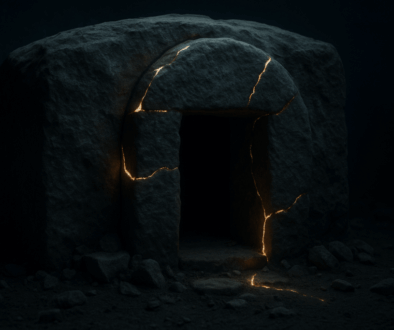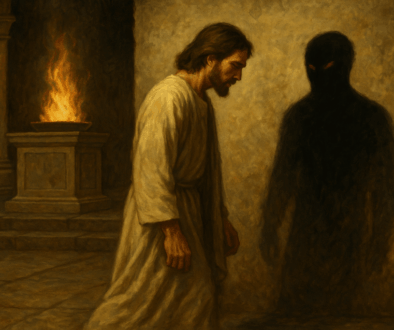Grief and Gratitude: The Same Song in Different Movements
“Happy are those who mourn…” (Matthew 5:4)
How can this be?
For a long time, this verse left me unsettled. Grief is sorrow, loss, and vulnerability—the feeling of being utterly helpless in the face of something that can never return.
How, then, could grief—the very thing that shatters and consumes—ever be a source of happiness?
I searched for an answer, turning it over in my mind.
And then, suddenly, they merged.
Not as opposites. Not as contradictions.
But as two notes in the same song.
Grief and gratitude, pulsing together—like music.
Grieving, Gratitude, or Both?
What happens when you allow yourself to fully feel loss?
You feel it pulsing through your body and soul, tears streaming, sobs breaking through your chest—a longing to be in tune with what is gone. You wish you could touch it again, inhabit that space once more.
But in a way, feeling attuned to it is exactly what grief is processing.
Grief is not about severing ties—it is about continuing a relationship in a new form. It is a passage into deeper connection, not disconnection.
Grieving becomes the echo of gratitude, reverberating through the long, dark tunnel of life. And the paradox deepens—grief becomes even more complex when there was no gratitude at the time of the event.
Perhaps grief is simply gratitude delayed—a recognition that arrives too late but demands to be felt anyway.
Think of all the times we realize too late what we should have cherished.
That sudden ache is gratitude arriving unannounced—only now, it is clothed in sorrow.
We need to get through that sorrow, to eat it, to move through it.
And in this way, grief becomes the gateway to gratitude.
The Song of Grief and Gratitude
The shortest and perhaps most profound verse in the Bible is:
“Jesus wept.” (John 11:35)
The most powerful being the earth had ever seen allowed himself to grieve.
He did not suppress his sorrow or turn away from it.
He let the song of grief ripple through him, just as fully as he embraced joy.
His tears were not just sadness—they were love made visible, gratitude flowing through the body. He wept because he loved deeply, because grief is never separate from love.
And so, in mourning, we do not merely suffer—we remember.
We honor.
We allow love to keep playing, like a melody that echoes long after the song has ended.
Much like a song, a symphony, grief and gratitude are harmonic patterns of energy, unfolding in time.
Music must find its way—moving, shifting, resolving, only to rise again.
It is waves of expansion and contraction, pulsating through our emotional fabric, informing us of our own depth and of the vastness of life.
It is beyond words. It is beyond thought.
For music mirrors the dynamic well of the soul better than any other expression. It carries feelings, transmits meaning, rising and falling for no other reason than to be a song.
And so it is with grief.
And so it is with gratitude.
A melody exists only as it moves—a note cannot be frozen, or it ceases to be music at all.
Grief is not the end of love, but its continuation in a new form.
Grief, too, must be played.
To grieve is to allow the music of what was to move through us.
To be grateful is to hear its echoes and still find them beautiful.
The Paradox of Mourning and Blessing
“Happy are those who mourn.” (Matthew 5:4)
Another paradox.
How can grief be a blessing? How can mourning lead to happiness?
Because to mourn is to open ourselves fully to the ebbs and flows of life.
We cannot pick and choose which emotions we welcome.
We cannot only open ourselves to joy while closing ourselves to sorrow.
Life is vast, relentless, and unfiltered—it gives us what it has, without asking if we are ready.
And yet, to mourn is to be alive.
Life is not only what pleases us—it is what moves through us, shaping us, growing us.
To resist grief is to resist life itself.
But to welcome it—fully, vulnerably—is to allow transformation.
Grief and Gratitude: The Rhythm of Light and Darkness
“Weeping may endure for a night, but joy comes in the morning.” (Psalm 30:5)
Just as darkness and daytime are natural cycles of life, so too are weeping and joy.
They are not opposites, not contradictions, but part of the same unfolding rhythm.
We must go through the night for the sun to rise.
And the closer we look, the more similar they become.
As the psalmist writes:
“Even the darkness is not dark to You; the night shines like the day—for darkness is as light to You.” (Psalm 139:12)
Grief and joy are not separate, just as night and day are part of the same eternal turning.
Grief works its way through us, like the slow rising of dawn.
It breaks open what was rigid.
It softens the heart so that gratitude can take root and flourish.
To grieve is not to be lost in the night—it is to walk toward the light that is already coming.
The Limits of Our Existence
Feeling loss is much like feeling a deep, painful love.
Grief is tears falling upon a memory—because you cannot get closer to the beauty, because you are reaching for something beyond your grasp.
Friedrich Nietzsche described a similar sensation:
“Ah, and now hast thou again opened thine eyes, O beloved Life! And into the unfathomable have I again seemed to sink.”
— Thus Spoke Zarathustra
We are confronted not only by what is lost but also by our own finitude—the reality that we cannot make the past live again.
No matter how much you long to capture a beautiful sunset, you never really can.
This is grief.
This is gratitude.
This is love.
Grief Is Not an Obstacle—It Is the Path
Grief is not something to overcome.
It is not a detour.
It is not a sign of failure or weakness.
It is the way through.
It is how love transforms.
It is how we remain connected, how we integrate what has passed into who we are becoming.
Grief is gratitude in its purest form.
“Acceptance of reality is what we really mean by the word ‘love.’”
— Stephen Cope, Yoga and the Quest for the True Self
Allow yourself to grieve.
Grieve the people you’ve lost.
But not just them.
Grieve your childhood.
Grieve the places that once felt like home but now feel like distant echoes.
Grieve the innocence that time has replaced with wisdom.
We must grieve every transformation.
By grieving these fragments, the fullness of them never leaves us.
Psycheverse: “Those who sow with tears will reap with songs of joy.”(Psalm 126:5)



